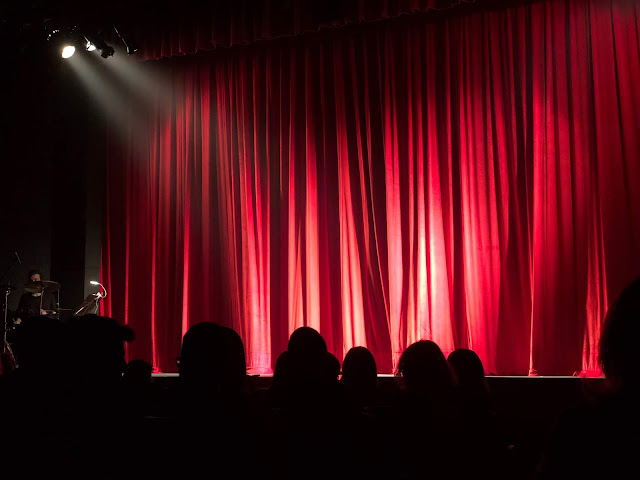Ego Check
Every now and then I need an ego check. Sometimes this comes from just a little bit of people watching.
I recently attended Imaginarium, a local convention for all sorts of SF creators--writers, film makers, game designers, and cosplay enthusiasts. It was a lot of fun and I met a lot of really great authors there, but there was one fellow that sticks in my mind as a good example of how not to behave. Let's call him Fred.
To be fair, I haven't been to a ton of conventions and I don't consider myself any kind of expert judge of social skills. That said, I do try and keep an eye out when I think I can learn, and just like with writing, being able to articulate what it is that affects me about someone else's behavior can help me calibrate my own. Fred was one such a calibration point.
Fred became part of the conversation I was having with an author at their table, and soon came to be the center of said conversation. While we were talking, Fred asked the author if he could follow up with them from a previous conversation to read the first chapter of his novel, to which the author kindly agreed. Fred proceeded to offer excuses for each criticism the author offered, and asked if he could share the inspiration of the novel--to which the author politely said he could. Fred did not recognize how he'd socially obligated the author to agree lest they be considered rude, and happily shared his story before continuing seamlessly on to other topics.
One of the things Fred said that particularly rubbed against my ideals was that he was unlikely to return to Imaginarium the following year because he didn't think there was anything else for him to learn at the convention. Someone at the convention had just given him valuable feedback, and yet he stood there claiming there was nothing left to learn. He also said he just needed to sit and do the work (which is true) and that attending Imaginarium was somehow mutually exclusive to that (which is untrue).
Fred also discussed the small press he worked for at an entry level. He said some condescending things, which I won't repeat here but that struck me as unprofessional given that their table was only a few rows away. I believe he was trying to impress the aforementioned author, who has been traditionally published, as if to say "we professionals understand each other, don't we?" without having been invited to said professional's club.
Based on this interaction, Fred seemed more than a little egotistical. Had I been an editor, I don't know that I would want to work with someone who already thinks they know more than everyone at the convention I'm attending, including their superiors at a small press. You never know where you might learn something valuable and being open to that is vital to improving your craft!
But I can't be too harsh. The thing is, five years ago I would have been Fred. Back then, I spoke about writing craft objectively and thought I knew oh-so-much. I didn't take criticism well, and talked the ears off of the published authors I'd met. I said a lot of stupid crap, and was totally wrong on a number of humiliating occasions. I didn't seek critique nearly as often or as intensely as I do now, assuming I didn't have much to learn. Part of why Fred's behavior rubbed me so wrong was that I was looking into an old mirror at a less-pretty version of myself.
Eventually, I recognized that the conversation I had been having with the author was profoundly over, and bowed out as politely as I could. Maybe I waited too long, lingering as an awkward hanger-on to a dead interaction. I still have some things I need to work on, but it wasn't a total loss: being able to witness Fred's interaction showed me how far I've come and how far I still have to go.
I implore everyone to learn from Fred. Appreciate what you can learn from every corner of humanity--even if you think you're passed it--and if you suddenly feel like a big fish in a small pond, check your ego.
Have you ever had an encounter like this one, or been the Fred? Tell me your story in the comments and we'll help each other avoid future snafus!
I recently attended Imaginarium, a local convention for all sorts of SF creators--writers, film makers, game designers, and cosplay enthusiasts. It was a lot of fun and I met a lot of really great authors there, but there was one fellow that sticks in my mind as a good example of how not to behave. Let's call him Fred.
To be fair, I haven't been to a ton of conventions and I don't consider myself any kind of expert judge of social skills. That said, I do try and keep an eye out when I think I can learn, and just like with writing, being able to articulate what it is that affects me about someone else's behavior can help me calibrate my own. Fred was one such a calibration point.
Fred became part of the conversation I was having with an author at their table, and soon came to be the center of said conversation. While we were talking, Fred asked the author if he could follow up with them from a previous conversation to read the first chapter of his novel, to which the author kindly agreed. Fred proceeded to offer excuses for each criticism the author offered, and asked if he could share the inspiration of the novel--to which the author politely said he could. Fred did not recognize how he'd socially obligated the author to agree lest they be considered rude, and happily shared his story before continuing seamlessly on to other topics.
One of the things Fred said that particularly rubbed against my ideals was that he was unlikely to return to Imaginarium the following year because he didn't think there was anything else for him to learn at the convention. Someone at the convention had just given him valuable feedback, and yet he stood there claiming there was nothing left to learn. He also said he just needed to sit and do the work (which is true) and that attending Imaginarium was somehow mutually exclusive to that (which is untrue).
Fred also discussed the small press he worked for at an entry level. He said some condescending things, which I won't repeat here but that struck me as unprofessional given that their table was only a few rows away. I believe he was trying to impress the aforementioned author, who has been traditionally published, as if to say "we professionals understand each other, don't we?" without having been invited to said professional's club.
Based on this interaction, Fred seemed more than a little egotistical. Had I been an editor, I don't know that I would want to work with someone who already thinks they know more than everyone at the convention I'm attending, including their superiors at a small press. You never know where you might learn something valuable and being open to that is vital to improving your craft!
But I can't be too harsh. The thing is, five years ago I would have been Fred. Back then, I spoke about writing craft objectively and thought I knew oh-so-much. I didn't take criticism well, and talked the ears off of the published authors I'd met. I said a lot of stupid crap, and was totally wrong on a number of humiliating occasions. I didn't seek critique nearly as often or as intensely as I do now, assuming I didn't have much to learn. Part of why Fred's behavior rubbed me so wrong was that I was looking into an old mirror at a less-pretty version of myself.
Eventually, I recognized that the conversation I had been having with the author was profoundly over, and bowed out as politely as I could. Maybe I waited too long, lingering as an awkward hanger-on to a dead interaction. I still have some things I need to work on, but it wasn't a total loss: being able to witness Fred's interaction showed me how far I've come and how far I still have to go.
I implore everyone to learn from Fred. Appreciate what you can learn from every corner of humanity--even if you think you're passed it--and if you suddenly feel like a big fish in a small pond, check your ego.
Have you ever had an encounter like this one, or been the Fred? Tell me your story in the comments and we'll help each other avoid future snafus!



Comments
Post a Comment